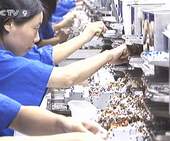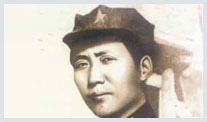|
China's private sector booming 
|
| 2002-10-10 17:40:48 |
 The introduction of private business has been one of the major forces powering China's economy since the opening up and reform. Wenzhou City in the eastern province of Zhejiang is a good place to get a first-hand look at the phenomenon. The introduction of private business has been one of the major forces powering China's economy since the opening up and reform. Wenzhou City in the eastern province of Zhejiang is a good place to get a first-hand look at the phenomenon.
With more money in hand and official encouragement behind them, more and more Chinese are joining the rush to buy their own homes. In tomorrow's Changing China special, CCTV Channel 9 will bring you an in-depth look at the country's home-buying craze.
In China's great experiment in market economics, the small city of Wenzhou in the eastern province of Zhejiang has been a trailblazer.
This region with few resources has, within the last 20 years, turned into China's booming and bustling capital of private economy. It sounds incredible. Yet the people there -- a people who have always had a genius for business -- created the miracle.
 Nan Cunhui is one Wenzhou resident with commercial flair. From mending shoes in the streets as a boy, he's now president of one of the largest electric appliance businesses in the country. His corporation employs 13,000 people and generates an annual output exceeding 700 million US dollars.
Nan Cunhui is one Wenzhou resident with commercial flair. From mending shoes in the streets as a boy, he's now president of one of the largest electric appliance businesses in the country. His corporation employs 13,000 people and generates an annual output exceeding 700 million US dollars.
But it has not always been like this for Nan. His electric empire grew out of a family workshop 18 years ago with barely 10 employees. At the time, the notion of private business was still a subject of much debate. More than a few people dismissed it as "the capitalist tail to be cut off." Yet Nan and his counterparts chose to buck the odds. Throughout the 1980s, workshops like these mushroomed in Wenzhou. Better able to meet market demands, these private businesses gained a foothold in a market previously monopolized by state-owned enterprises. This was despite the sometimes ambivalent government attitude toward the sector.
Wu Bingchi, vice president of Chint Corporation, said: "In spite of the growth, one big problem troubled us for a long time -- we were afraid that the government policy might change. So we had to be cautious. It was not until the 15th National Party Congress in 1997 that private business was recognized as an important part of the socialist market economy."
The last five years proved to be boom years in the private sector. Many family-centered businesses -- such as Nan's -- have since grown into share-holding companies, turning a new page in the city's development.
 In Wenzhou, market economics is in full play: division of labor, high technology, and capital in search of profits. One constantly feels the rhythm of modern business organizations and high-energy corporate culture.
In Wenzhou, market economics is in full play: division of labor, high technology, and capital in search of profits. One constantly feels the rhythm of modern business organizations and high-energy corporate culture.
Chen Jianle, production coordinator of Chint Corporation, said: "Everybody is working hard, facing life eagerly. For us, time is really important and no one wants to miss the opportunity of development."
Today, Wenzhou is drawing young people from across the country. The private sector has come to dominate the city's economy, and with that has come two decades of double-digit economic growth. This fast-growing figure may not apply to all other parts of the country. Nevertheless, it signifies a trend. It's estimated that throughout China, more than 30 million people are already involved in the private sector and the number continues to grow.
Twenty years ago Nan Cunhui and his like-minded businessmen set up their private businesses against the ridicule of other countrymen. Today their success stories have become the models many aspire to follow. Indeed, any visitor to Wenzhou today will be deeply affected by the enterprising spirit running through the city. Such a spirit has not only transformed the landscape of Wenzhou, but also made private business a catch-word of China's fast-changing economy.
|
|










